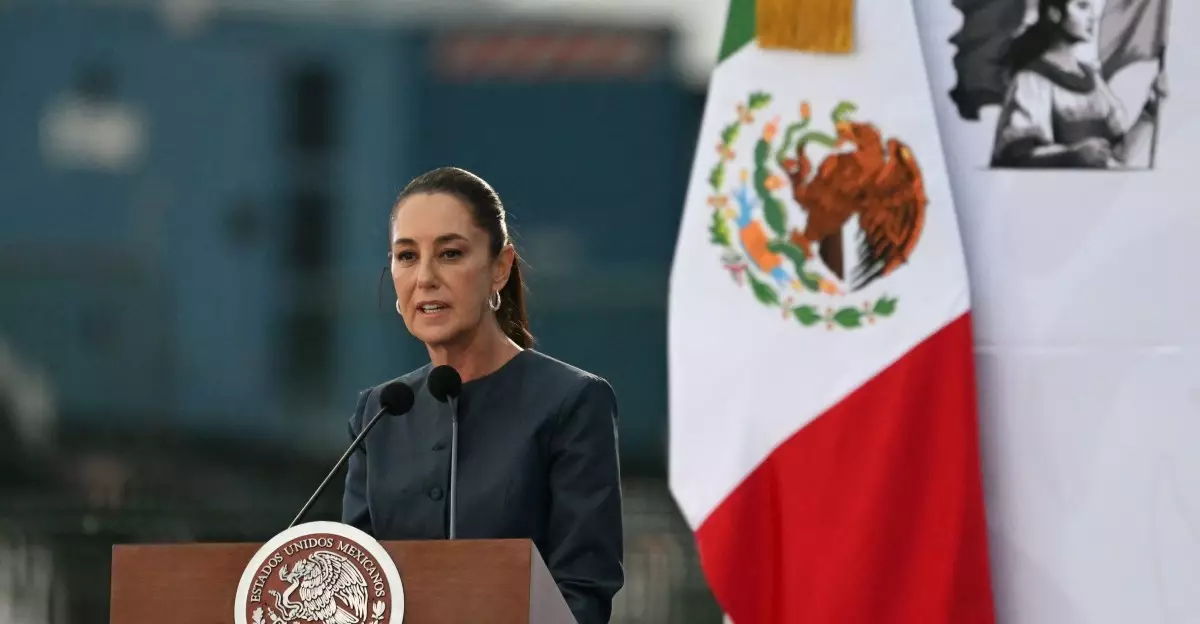In an unprecedented conflict between nations and tech giants, the recent naming of the Gulf of Mexico by Google as the “Gulf of America” evokes deep sentiments about national identity, sovereignty, and corporate responsibilities. The situation has often echoed larger themes in international relations, where symbols can ignite fierce debates. Mexican President Claudia Sheinbaum’s prominent response to this name change demonstrates the intricacies of cultural heritage entwined with modern technological influence. The ramifications of this incident extend beyond cartography and delve into the core of national pride and the authority over geographical nomenclature.
The Legal Battle: Sheinbaum’s Challenge to Google
President Sheinbaum’s announcement of a lawsuit against Google marks a significant escalation in a dispute that started with a seemingly straightforward order from former President Trump. Her government argues that Google’s decision to label the Gulf of Mexico differently for U.S. users infringes upon Mexican sovereignty, as the Gulf’s identity is not solely the purview of the United States. Sheinbaum articulates a position that not only challenges Google’s corporate decision but also addresses a critical legal question regarding naming authority. This moment captures the intersection of governance and technology—and poses questions about who really has the final say over place names that carry historical and cultural weight.
Historical Context: Sovereignty and Naming Rights
Understanding the implications of this naming dispute requires a glance into historical context. Names of geographic features often reflect colonial pasts and shifting power dynamics. The term “Gulf of Mexico” has been in use for centuries, and to rebrand it as “Gulf of America” arguably attempts to shift that historical legacy towards a contemporary political narrative favoring U.S. exceptionalism. Sheinbaum’s assertion that naming rights have an international dimension draws attention to the fact that geography is not merely a canvas for individual national narratives but an interactive space where multiple identities converge. This crucial distinction challenges the authority of any singular entity—be it a government or corporation—to dictate how these regions are represented globally.
Corporate Responsibility vs. National Identity
Tech companies like Google wield significant power in shaping how information is presented to the public, thereby influencing perceptions of identity and geography. Sheinbaum’s move to sue Google highlights an urgent need for these corporations to engage more responsibly with the societal implications of their choices. When a giant like Google alters a well-established geographic name, it isn’t merely a navigational choice—it sends ripples through national sentiments, fueling anger and resentment. Furthermore, it calls into question the responsibility of corporations to adhere to international considerations in their operational decisions, especially when those decisions can marginalize national dignity.
A Broader Political Landscape
While President Sheinbaum’s stance against Google seems inherently focused on the localization of geographical nomenclature, this situation also plays into a broader political narrative. The recent passage of a bill in the U.S. House, which aims to solidify the name change to “Gulf of America,” reflects an unfortunate trend towards entrenched nationalism in an increasingly globalized world. Such political maneuvers often serve to galvanize support at home while disregarding the ramifications on international relationships. It represents a dichotomy between national interests and global diplomacy that will become even more complex as technological platforms continue to gain influence over cultural perceptions.
As tensions mount over Google’s decision, the implications for America’s brand on the global stage become clearer. Naming is an act of power; it carries meanings that resonate deeply with populations. The United States, through its insistence on using “Gulf of America,” may inadvertently challenge not only its relationships with neighboring countries but also its commitment to a respect for diverse cultures and identities. In this age of digital globalization, it’s critical for nations and corporations to recognize the interconnectedness of identity and geography, and to foster dialogues that champion inclusivity over divisive rhetoric.

